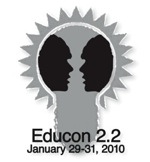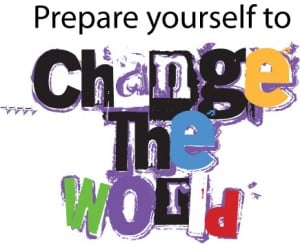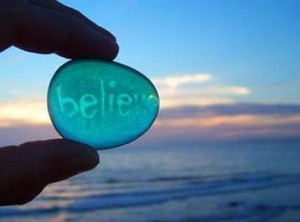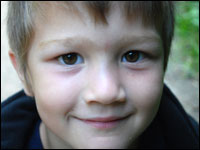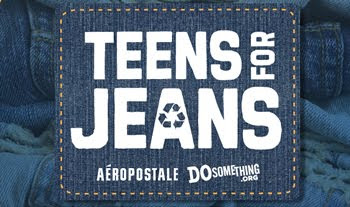I introduced an immigration unit to my 8th graders with Shaun Tan’s The Arrival. My instructions were to “read” the book. Now, if you’ve never read The Arrival, it is a graphic novel with absolutely no words. It was fascinating to see my more traditional students really struggle over how to “read” this book, and amazing to see those visual learners and outside of the box thinkers plow right through it. While reading, they had to keep track of characters, setting, problem(s), solution(s), and symbols. This generated a great discussion about using symbols in writing. From that, they were to create a “found poem” with words or phrases from the book. The problem? There are no words or phrases in the book…now that was a challenge! Click the book (double click to read each poem) that we created above to view my 8th grader’s interpretation of Shaun Tan’s The Arrival through found poetry. Enjoy!
Author Archives: mrspal1
Educon 2.2: Professional Development in my pj’s! #educon
Sounds too good to be true, huh? Professional Development in your pajamas? That is exactly what I did this weekend. Unfortunately, I did not get tickets on time to go to educon in Philadelphia, so I had to go with plan B. I had my laptop up and running with my #educon twitter feed running in one window and the Friday night keynote panel discussion: What is Smart? streaming on vokle.com in another window. Here, I heard Loren Brichter, Martha Farah, Happy Fernandez, Eddie Glaude, and David Shenk discuss their thoughts on what they thought smart was. While the discussion was going on, I was having other discussions about the topic on twitter. What did I learn from the keynote panel?
- Howard Gardner was right.
- Dewey is still awesome.
- Smart means different things to different people.
- It is really hard to follow a neuroscience professor.
- Passion for something is vital for being “smart” in it.
- Elementary teachers resonate most with “smart” people.
- My favorite question posed: How do we make smart?
I woke up Saturday morning to watch the vokle stream of the morning keynote Marilyn Perez. I found myself more concerned about what conversations I was going to attend than listening to the stream. It was a good thing, though, because I got into my first choice conversation for session 1: Teaching Big Ideas to 21st Century Learners with Ben Hazzard and Zoe Branigan-Pipe. I will have to admit, that the technology of the elluminate session was painful at best to begin with. So, while they were working on that, I was adding to my PLN (personal learning network) by searching through the #educon twitter feed. Wow! I am blown away by the people that I met and what they have to say about education and learning. So, what did I learn from Zoe and Ben?
Ask yourself these questions when thinking about Big Ideas..
- What are the relevant topics you can address with your students?
- How can you make learning meaningful?
- What are the Big Ideas your students will find relevant?
- What 3 takeaways do you wish for your students. Answers from the session can be found here.
During lunch, I followed Will Richardson to a demo by Jeff Han via ustream of the perceptive pixel, a multitouch interface that was amazing.
Next, I decided to multitask and attend two conversations. The first was by Christian Long with the Alice Project. The second was by David Warlick about Learning 2.0. What did I learn here?
- If you don’t establish boundaries, you can’t release creativity.
- Ask students great questions and demand they prove it in public.
- What does great learning look like?
- Wow… The Alice Project
- There are cool new tools for Blooms that were introduced here.
My last session of the day was with Chris Lehmann, the principal of the Science and Leadership Academy called, Leadership 2.0: Who do we need our leaders to be? Currently, I’m finishing my Master’s in Educational Leadership and working on my principal’s certification, so this one was the one I was really looking forward to. There are some people that are born to be leaders; Chris Lehmann is one of them. What did I learn from Chris?
- Leaders need to use inquiry, technology infusion, and communities of care.
- In inquiry learning, follow the lead of the students.
- Technology should be a part of every day and transformative.
- A caring community is one that is 24/7…in school, out of school, online, and off-line.
- Character education needs to go deeper than the posters we hang around the school.
- Teachers need to know the vision/mission of the school in order to incorporate it into their lessons each day.
- Servant leadership is top down support for bottom up ideas.
- Leadership is being able to get everyone on the same common ground, then move them forward.
- You can’t bully teachers into caring for students.
- Every good teacher knows how to outlive a mandate.
So, my mind was absolutely spinning from the day. I took the kids out to Target and out to dinner. When I got home, I went back to the #educon twitter feed to see what I could catch up on. This community of learners were now synthesizing the information they learned in the other sessions that I couldn’t attend and were sharing it with all of us…now those are some great teachers/learners/leaders/collaborators! I came across an ebook that was made in Ben Hazzard’s second session here:
Amazing how a group can collaborate so effectively! Thanks to all who helped create the field guide.
Now it is Sunday morning…unfortunately, I won’t be attending any virtual conversations today because I have to catch up with the real world and everything I ignored yesterday. Was it worth it? Absolutely! This was an amazing learning experience for me. I have built a personal learning network that I will be able to learn from every day. Hopefully, I’ll be able to meet them in person next year!
So….what did you learn this weekend??? ;o)
Learning to Change – Changing to Learn
I came across this video on kylepace that was created by COSN. I was blown away by the video because I think it says everything about education today and in the future that has been swirling around in my head. These are the things that resonated with me most from the video:
- the kids are having a much more stimulating, enriching environment outside of schools than they are inside of schools
- students are big communicators and content developers, yet all of the tools they use to do that are banned in schools
- it’s about relationship, it’s about community, productivity, access
- they live in the “nearly now” where they can reflect, retract, and research
- the student is at the center and school is just one of the places that they learn
- we’ve got a classroom system, where we could have a community system
- we have to develop a narrative that sustains 21st century learning
Schools and teachers are going to have to seriously consider these factors when developing new curricula as well as daily lessons. We need to take advantage that they are so connected to and use it in a meaningful, collaborative, and creative way.
The power of emotions & writing: what I was not prepared for…
I continued with my activities to prepare my 8th graders to write their “This I Believe” personal statement. The first day was spent identifying and defining values along with ranking those values to what was most important to them.
The second day was what I was not prepared for in doing this assignment with my students. I asked students to freewrite about the following questions:
- When did you first realize your family loves you?
- When did you learn that it is better to tell the truth?
- Who was the first person to make you feel invincible?
- When did you realize you could be anything you want to be?
- When did you learn that life isn’t always fair?
- Who taught you that sometimes things don’t work out the way you want them to?
- When did you learn that you can’t always get what you want?
- How did you learn about the Tooth Fairy, or other characters?
- Has anyone ever tested your faith?
- Have you ever done something that you regret? What did you learn from that moment?
I read the questions, that I got from the This I Believe curriculum, and when I was finished, the room was silent. Dead silent. Then, a few hands went up. The question that struck me most was, “What if you just realized someone loves you? Can it be recent or does it have to be from when you were a little kid?” With that, I answered by telling them a story about my gram. I always knew that she loved me, but I could remember a specific time when I was a young adult that I truly realized that she loved me. I got teary just telling the story….but what happened next, I was completely unprepared for…
I told the students to answer the questions as best they could on a separate piece of paper, and that they could skip around. Some students sat at the table, some sat on the floor, and others asked to go in the hallway. Once they started writing, I heard sniffling, people getting up for tissues, and some outright sobbing. I was amazed at the power that a question could stir up such emotion. These kids were writing like I’ve never seen…totally focused and engaged. I was overwhelmed by emotion myself as I saw my students “go there” emotionally…and that they were doing it through writing. It dawned on me that they felt safe and secure enough in my class to be that emotionally open. This is what I was completely unprepared for. I never imagined that a little writing exercise could be so powerful to them, and to me, but…I will remember to never underestimate the power of words and the emotional connection that we have to them.
What will education look like in 20 years?
This morning, I came across a poll from Edutopia that asked: What will online learning look like in 20 years? My answer was that it would be prevalent, continuing to grow, and will be growing in popularity. This seemed to be the most popular answer. As I pondered this, I asked myself what education would look like in 20 years. Twenty years ago, I was entering college. We had word processors, not laptops, and presentations were still done with colorful posters that were painstakingly made. I can’t remember when I got my first email address, but I can remember my first home computer in 1997! That wasn’t that long ago…or was it?
I’ve been teaching for 15 years…and I wondered how much education has changed during that time. There have been a lot of changes using technology. I would have to say that incorporating new technologies into my classroom is what keeps me current and what keeps my students engaged. I am a risk taker and enjoy the challenge of change, but I know that is not the general consensus with teachers across the board. So, there have been a lot of things that haven’t changed in education in the past 20 years. Without support, interest, and differentiated instruction for TEACHERS, a lot of “new technology” is “old teaching” with some bells and whistles.
So when I ask myself what education will be like in the next 20 years, I imagine it to be a little more advanced with some more bells and whistles with some trailblazing teachers that embrace it, some that go with the flow and try to keep up, and some that are “old school”. I do know a few things: education is slow to change….slow is fast in education…and innovation & technology are useless unless the teachers are supported and encouraged to try it and use it.
I’ll still be teaching in 20 years…I’ll only be 57. I look forward to the future of education and am excited to see what it brings…whatever that may be! Where will you be in 20 years and what will education look like for you?
This I Believe: Out of the mouths of babes
I am beginning a project with my 8th graders based on NPR’s This I Believe. My students are writing about what they believe in 350-500 words. I plan on having them podcast their pieces as well as create an “ipod” ad of themselves that is hosted on our wiki as the final project.
As I introduced the project, some of the students were struggling to define values and choose what five values are the most important to them…certainly a daunting task for 8th graders! I found this amazing podcast on the website that was written by a kindergarten student.
When Tarak McLain’s kindergarten group celebrated their 100th day of class, some kids brought 100 nuts or cotton balls. Tarak brought a list of 100 things he believes. Now a first-grader, Tarak shares his top beliefs about God, life, nature and war.
Click here to listen to his “This I Believe” podcast.
I’ll keep you posted on the progress of my own students’ pieces!
Homeless Teens in America: Did you know? (Teens for Jeans)
Teens for Jeans: Now helping Haiti!
Current Events: Haiti 360 degree video
 Check out this 360 degree video from CNN. More 360 degree videos by immersive media can be found here.
Check out this 360 degree video from CNN. More 360 degree videos by immersive media can be found here.


